|
Healthwatch |
Compiled and coordinated by Edward
Arambewala |
Preventing ‘Rat Fever’ (Leptospirosis) with penicillin tablets
Prof. Upali Illangasekera (MD, FRCPE, FCCP)
Associate Prof. Medicine Peradeniya Medical Faculty
Leptospirosis (colloquially called ‘Rat fever’) has claimed several
precious lives in different parts of the country. Death is usually
caused by kidney or liver failure and rarely by involvement of the heart
(‘myocarditis’).
Most patients affected by the illness are from the middle or lower
socio-economic classes. Early recognition and treatment would prevent
these unfortunate deaths. A number of doctors as well as educated lay
persons have contributed articles to the press about this dreaded
illness.

As in most other illnesses prevention is of paramount importance in
Leptospirosis. This is particularly relevant in a poor country such as
ours where the state has to expend its precious and limited resources in
treating these patients for an illness which could be prevented.
As in other illnesses caused by infections Leptospirosis too could be
prevented by lifestyle measures such as wearing protective foot wear and
avoiding places known to be contaminated by the urine of the field rat
which carries the organism. The other well established measures such as
immunisation has not been adopted for this illness.
However a drug which is used in the treatment could be used in its
prevention so that it is available in the persons blood stream at the
time of exposure thereby destroying the organism causing Leptospirosis.
The technical term for the use of a drug in the prevention of an
infection is called ‘chemoprophylasix’. The drugs used for this purpose
includes penicillin and doxycycline. The latter is more expensive and is
not freely available in our country.
The Department of Medicine, Faculty of Medicine, University of
Peradeniya recently carried out a field study in a high transmission
area of Leptospiross in the Yatinuwara and Udunuwara electorates to
determine the effect of penicillin in the prevention of this illness.
The total adult population of these two electorates was 215607 from
which as ample of 800 were selected for the study.
The research team was lead by Prof. Upali Illangasekera and assisted
by Prof. S.A.M. Kularatne, Dr. Kumari Pussepitiya, Dr. Nalaka Premaratne
and Dr. Ranjith Kumarasiri and funded by the World Health Organisation.
The study was conducted on a ‘double blind randomised control design’
where a drug and a ‘placebo, (a similar looking drug but which is inert)
is administered to two identical groups of people who are exposed to the
illness.
The study is ‘double blind’ since the patient as well as the doctor
is unaware whether a person is on the active drug or the ‘placebo’. The
results of such experiments are accepted as valid by the scientific
community and was infact published in the South Asian Journal of
Tropical Medicine and Public Health (Sept. 2008 issue).
This study revealed that oral penicillin (penicillin tablets) may be
effective in the prevention of Leptospirosis in those who are exposed.
This drug is relatively cheap and easily available. We advocate that it
should be taken at a dose of two tablets twice a day at least two days
before a person gets in to a paddy field and continued for two weeks
after he no longer is in the field.
However we wish to caution that it should not be taken without the
supervision of a medical officer particularly those who have a history
of allergy to drugs.
Twins stole the show at Medical Crossword draw - 35
|
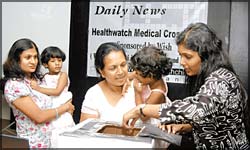
Three year old twins Yenuli (right) and Sanuli (left) picking
the first and second prize winners. |
|
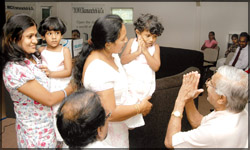
Prof. Colvin Gooneratna wishing the twins and their mother good
health. |
Three-year-old twins, stole the hearts of all present at our 35th
HealthWatch Medical Crossword draw held last week at WISH auditorium at
Delkanda, Nugegoda.
They were the first twins in that age group in South East Asian
region to have undergone the latest cochlear implant surgery for hearing
loss from birth, thus making medical history for cochlear implants.
The medical professional team comprising Prof. Colvin Goonaratna, Dr.
A.D.K.S. Yasawardena ENT Surgeon, Dr. Kelum Palpola and Audiologist
|
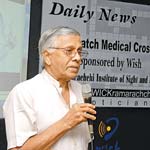
Prof.Colvin Gooneratne professor of physiology Colombo Medical
Faculty and Chairman Daily News Associated, Prof. Colvin
Gooneratne Centenarian Help Group and Study, speaking at the
event. |
|
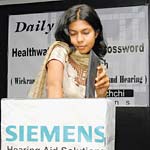
Medical Student Ashra Majumudeen picking the third prize winner. |
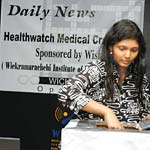
Ramona de Silva of WISH picking the consolation prize winners. |
|
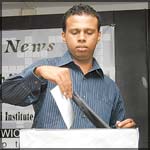
Dr. Kelum Pelpola picking a prize winner. |
and Director WISH who were invited to launch the crossword draw
having seen the history making twins in cochlear implants chose to get
them to launch the draw, by picking the first two winners in the
Crossword No. 35, which they did carried by their mother, to the
applause and appreciation of all present, thus steeling the event with
their cochlear baby performance.
Student winner wins again
Another interesting thing that happened at this draw was the first
prize winner in Crossword No. 33. Ajuma Najumudden, 21-year-old medical
student who was invited to pick a winner, picking her own entry for a
prize, which was applauded by all present, and made Prof. Colvin to
comment, that it could be a record in Crossword draws.
|
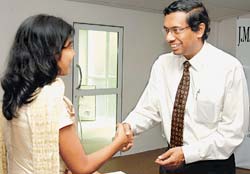
Dr. A.D.K.S. Yasawardena ENT Surgeon LRH congratulating
first prize winner in Crossword No. 33 Fathima Majumudeen
after handing over her prize cheque for Rs. 3,000. |
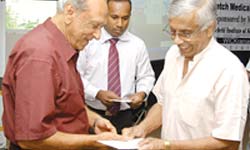
Prof. Colvin Goonaratna (R) handing over consolation prize
winner in Crossword No. 33 R. Samarasinghe his prize. |
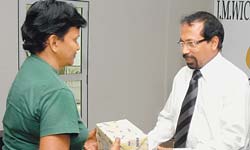
Mihiri Wickremarachchi (R) handing over consolation prize in
Crossword No. 33 to P.S. de Croos (L). |
|
The Winners
The following have won prizes at the HMC No. 35 drawn on
Tuesday, December 9, at the Wickremarachchi Institute of
Sight and Hearing (WISH) Auditorium at No. 435, High Level
Road, Nugegoda.
First Prize Rs. 3,000.00
Joan Ondatjie (Age 40)
C/o. Hema Gunasekera
No. 9, Stanley Tillekeratne Mw.
Nugegoda. (Receptionist)
Second Prize Rs. 2,000.00
J. L. Mettananda (Age 72)
425/B14/1, Mahawatta
Kendaliyadda Paluwa
Ganemulla.
Third Prize Rs. 1,000.00
Ashra Najumudeen (Age 21)
No. 5, Initium Road,
Dehiwala. (Student)
Consolation prizes of Rs. 1,500 discount
vouchers for specs from JWW
(1) A.E. Mack (Age 63)
29/C/16 Rukmale Housing Scheme
Kottawa.
(2) Kamani Hemachandra (Age 49)
210, Kotte Road
Welikada
Rajagiriya. (Rajagiriya)
(3) Martin Telkarage (Age 80)
Lawyers’ Office Complex
Courts Road
Gampola. (Attorney-at-Law)
Sponsored by Wickremarachchi
Institute of Sight & Hearing |
Vitamins C, E don’t protect against cancer: studies
Vitamins C and E do not appear to reduce the risk of cancer,
according to a pair of new studies which debunk earlier research
suggesting supplements might provide some protection against the often
deadly ailment.
Some 15,000 men aged 50 and older participated in the study, which
included an eight-year follow-up period, but neither vitamin appeared to
appreciably reduce their cancer risk, according to the studies appearing
in the January 7 issue of the Journal of the American Medical
Association (JAMA).
The findings are disappointing news for the more than half of
American adults take vitamin supplements — many in the hope of warding
off illness. They appear to refute earlier observational studies that
linked use of vitamins E and C with reduced risk of certain forms of
cancers, including cancer of the prostate.
One of the two studies — the Selenium and Vitamin E Cancer Prevention
Trial (SELECT) — found that vitamin E or selenium supplements, whether
taken alone or in combination, appear not to reduce the risk of prostate
cancer, which is the second leading cause of cancer death in the United
States.
“It may be time to give up the idea that the protective influence of
diet on prostate cancer risk can be emulated by isolated dietary
molecules given alone or in combination to middle-aged and older men,”
Peter Gann of the University of Illinois at Chicago reflected in a JAMA
editorial.
AFP
Reuters Health News Summary:
Following is a summary of current health news briefs
Cancer to pass heart disease as No. 1
killer
Cancer is on pace to supplant heart disease as the No. 1 cause of
death worldwide in 2010, with a growing burden in poor countries thanks
to more cigarette smoking and other factors, global health experts said
on Tuesday. Globally, an estimated 12.4 million people will be diagnosed
with some form of cancer this year and 7.6 million people will die, the
U.N. World Health Organization’s International Agency for Research on
Cancer said in a report.
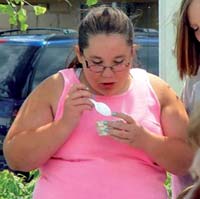 Obesity
may raise headache risk Obesity
may raise headache risk
Being overweight or obese may increase the likelihood of having
severe headaches and migraines, new study findings suggest. An increased
prevalence of headache may be associated with being underweight as well.
In analyses of 7,601 adult men and women, Dr. Earl S. Ford and
colleagues at the U.S. Centers for Disease Control and Prevention in
Atlanta, report that being overweight or obese increased the likelihood
of headache by 1.2- to nearly 1.4-times.
Nuts boost health benefit of
Mediterranean diet
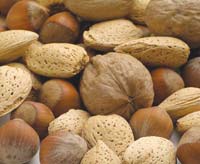
Adding nuts to a traditional Mediterranean diet rich in fruit and
vegetables appears to provide extra health benefits, Spanish researchers
said on Monday.
A daily serving of mixed nuts helped a group of older people manage
their metabolic syndrome, a group of related disorders such as obesity,
high cholesterol, high blood pressure and abnormal blood sugar, Jordi
Salas-Salvado of the University of Rovira i Virgili in Spain and
colleagues said.
Smartest men may also have highest
sperm
The smarter the man, the higher the quality of his sperm, new
research published in the journal Intelligence shows.
But women having difficulty conceiving shouldn’t question their
partner’s intelligence and men who aren’t quite geniuses should not
worry about their ability to father children, lead researcher Rosalind
Arden of Kings College London told Reuters Health.
“This is scientifically interesting, but unimportant in terms of
people’s likelihood of conception or fertility,” she said in an
interview.
Flu shot half dose just as good for
younger adults
A half dose of flu vaccine may work just as well as the full dose for
healthy adults under 50 — a finding that could help stretch supplies in
the event of a future vaccine shortage, researchers said on Monday.
The study involved about 1,100 U.S. adults, about half of whom were
given a half dose of influenza vaccine in November and December 2004 and
the rest were given a full dose.
 Mobile
phone chip to counter radiation unveiled Mobile
phone chip to counter radiation unveiled
Belgian health products distributor Omega Pharma will launch a chip
it claims can counter potentially damaging radiation from mobile phones
and has high hopes for its sales. The company, which sells
non-prescription products such as wart treatments, pregnancy tests and
sun tan lotions to pharmacists, unveiled the E-waves phone chip on
Tuesday, a day before its launch in
Belgium. REUTERS
Statin treatment does not cause cancer
Dr. D. P. Atukorale
There are misconceptions in the minds of some physicians that persons
who develop very low levels of LDL (bad) cholesterol following treatment
with statins develop cancer following the publication of an article in a
recent issue of the American Journal of Cardiology by Alsheik - Ali
(volume 50, 2007).
Above report also has caused some fear and apprehension among
patients who are being treated with statins which is a group of
cholesterol lowering drugs commonly prescribed by physicians for
elevated LDL cholesterol. In a very recent report in the same journal
(volume 52, 2008) same authors say that satins, despite producing marked
reductions is LDL cholesterol are not associated with an increased risk
of cancer.
The authors now say that the previous reports of patients getting
cancer had nothing to do with statins and the authors are of the opinion
that statins are quiet safe for patients having high LDL cholesterol.
It is noteworthy that cancer cells can reduce the level of LDL
cholesterol in the body long before the appearance of the clinical signs
of cancer and the low LDL cholesterol level is due to tumour cells
catabolizing LDL at a higher rate than normal rate. Thus this low LDL
level is the result and not the cause of cancer. Subjects with latent
cancer produce low LDL cholesterol irrespective of whether they receive
statins or not. Anyway most of the physicians do not prescribe statins
to patients with normal or low cholesterol-levels.
Low LDL cholesterol levels have been observed for as long as 10 years
before signs of cancer are detected clinically. Other chronic diseases
such as alcoholic dependence (addition) are also associated with low LDL
Cholesterol.
Every person with very low LDL cholesterol is not a potential case of
cancer and a very rare condition called hypobeta-lipoproteinaemia does
very nicely with LDL levels as low as 10mg to 20mg and these people
sometimes have long lifespans. To conclude neither statin treatment
itself nor the low LDL levels induced by statins increases the risk of
cancer. |

